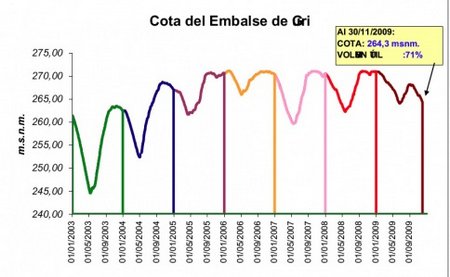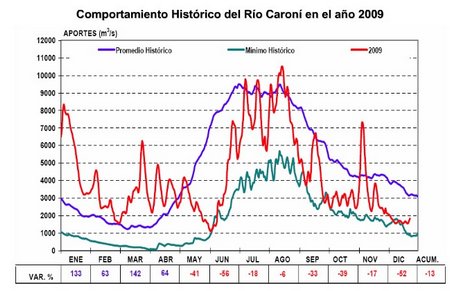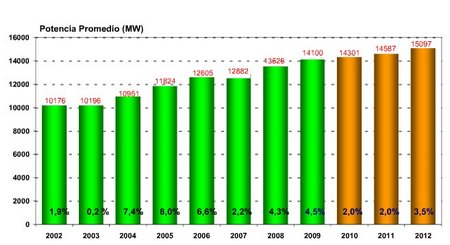The Devil´s Excrement blog
……

each vertical line indicates the height of the water level on January 1st of each year. As you can see, the level is at 264 meters above sea level. In both 2003 and 2004, the level was found to be lower on Jan. 1st than it is today. Thus, at first glance one would think that given that this crisis seems to be playing out to be much more dramatic than in 2003 and 2004, this is not justified.
But it is, because in 2003 and 2004 the Rio Caroni that feeds the Guri dam was not running at such a low level as it is running today as shown in the next graph:

This is a plot of the day by day flow of the Caroni river (in red) during 2009 where it is compared to the worst flow recorded in history (in green) and the historical average (in purple). As you can see the water flow is 50% of the historical maximum at this time of the year and very close to the historical minimum. And this is precisely the problem, the dam is not filling as fast as usually is which means that if you keep using it at full capacity, the water level will drop to critical levels much faster than it did in 2003 and 2004.
And yes, you can blame El Niño for that, but this is not an unusual phenomenon either, it comes and goes in periodic cycles. But since you can not longer blame the previous Government (even if it was tried) you might as well assume the usual “don’t blame me” attitude of the Chavista Government.
But in the end, El Niño is not the real problem either. The real problem is that demand since 2004 has grown by ~40%, as can be seen in the next graph:

And what is the reason for this growth? Well, the main reason was the oil boom, which led to a spending and consumption boom, but there is also a factor of the lack of any incentives to save energy or electricity. Not only have rates been frozen for 7 years, but 32% of residential homes steal their electricity and many Government offices and institutions do not pay Corpoelec or pay with considerable delay.
………
Leer el articulo completo en :
devilsexcrement.com/2010/01/07/still-thinking-about-that-electricity-problem-in-venezuela/